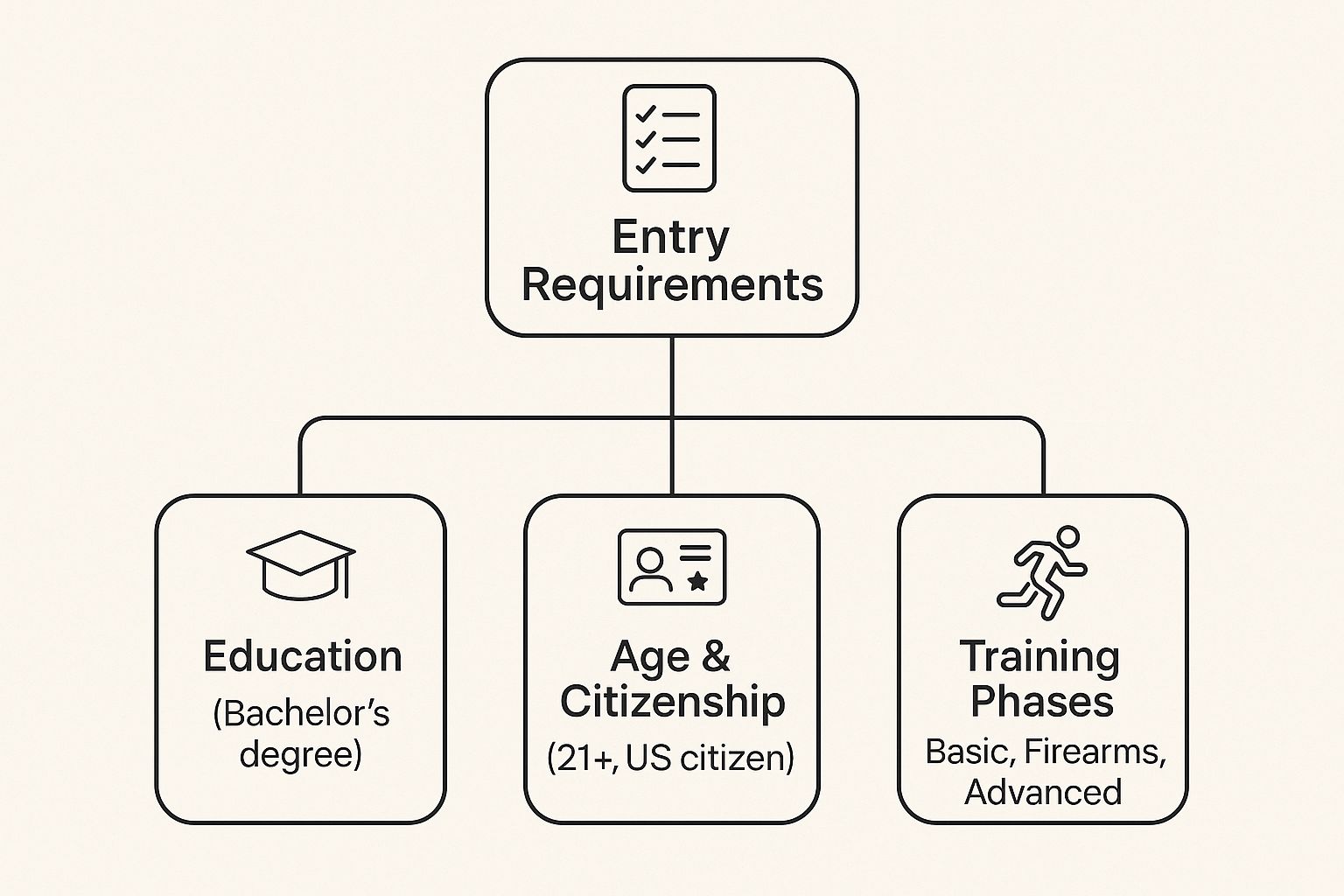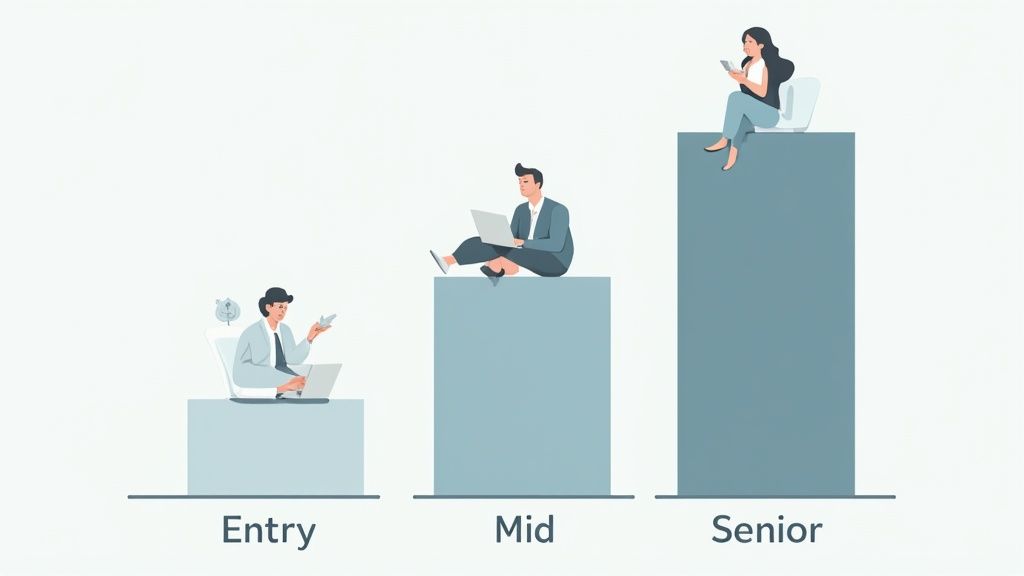Air Marshal Salary: How Much Does an Air Marshal Make? (2025)
.webp)
Thinking about a career as a Federal Air Marshal? It's a demanding, high-stakes job, and one of the first questions on anyone's mind is, "What's the pay like?" Let's cut through the noise and get straight to what you can realistically expect to earn.
The simple answer is that an entry-level air marshal salary often starts in the $40,000 to $60,000 range annually. But honestly, that's just the starting line. Your actual take-home pay can be much higher once you factor in experience, where you're stationed, and the specialized roles you might take on.
What to Realistically Expect for an Air Marshal Salary

When you’re weighing a career this important, you need a clear, no-nonsense picture of your earning potential. It’s not just about a number on a paycheck; it's about seeing if this vital, challenging role can support you and your family.
Think of an Air Marshal's salary less like a flat, fixed rate and more like a dynamic package that grows with you. It’s influenced by a handful of key factors that work together to shape your income from your first day on the job through your entire career.
Key Factors Influencing Your Pay
Several core components will dictate what you earn. These aren't just minor tweaks to your base pay; they are the fundamental building blocks that can significantly boost your income over time. To really understand what a Federal Air Marshal makes, you have to look at the whole picture.
The Federal Air Marshal Service, which is part of the Transportation Security Administration (TSA), doesn't use the standard government GS pay scale. Instead, it has a unique SV grading system. For new hires, this usually means a pay band ranging from $39,358 to $60,982 per year. But that’s truly just the beginning. As you gain experience and move into higher pay bands, your salary can climb much, much higher. You can learn more about how the pay bands impact earning potential.
To break it down, a few main things determine your salary:
- Pay Band: This is your starting grade, based on your qualifications and past experience.
- Locality Pay: A crucial adjustment that accounts for the cost of living in your assigned city.
- Experience Level: As you advance in your career and prove your skills, your pay increases accordingly.
The single biggest factor people underestimate is locality pay. Getting assigned to a major hub like New York or San Francisco can boost your base salary by over 30%. That's enough to turn a good salary into a great one.
This structure is designed to be fair. It ensures your compensation doesn't just reflect your skills, but also the real-world cost of living where you're based. It's a system that makes this career path both rewarding and financially sustainable for the dedicated individuals who step up to serve.
Understanding these variables is the key to seeing the full financial picture. Let's look at how they come together.
Key Factors Influencing Your Air Marshal Pay
The table below summarizes the primary elements that determine an Air Marshal's total compensation package.
Ultimately, your salary as an Air Marshal is not static. It's a reflection of your commitment, your location, and your growing expertise in a field critical to national security.
Decoding the Federal Air Marshal Pay Scale System
One of the first things people ask is, "How much does an Air Marshal make?" The answer isn't a single, flat number. It's actually determined by a dynamic system built specifically for high-stakes federal law enforcement. To really get a handle on your earning potential, you need to understand the unique pay scale the Transportation Security Administration (TSA) uses. This isn't your typical General Schedule (GS) scale that you see in most other government jobs.
Instead, the Federal Air Marshal Service (FAMS) runs on a specialized SV pay band system. Think of it like a career ladder. You start on the first rung and, through a mix of experience, strong performance, and taking on more responsibility, you climb to higher rungs—like Pay Band H or I.
This setup is designed to directly tie your dedication and skill to your financial growth. The harder and smarter you work, the more you can earn.
The Path to Becoming an Air Marshal
Of course, before you can even think about pay bands, you have to get your foot in the door. Every single candidate must meet a set of strict, non-negotiable requirements. These criteria exist to make sure only the most qualified and capable individuals are chosen for such a critical role.
This infographic lays out the essential checkpoints on the journey to becoming a Federal Air Marshal.

As you can see, it all starts with hitting key benchmarks for age, citizenship, and education. From there, you have to successfully navigate several intense training phases before you're officially on board.
Advancing Through the Pay Bands
Once you're in, your starting air marshal salary is set by your initial placement in a pay band—which is typically the G band for new hires. Every band has its own salary floor and ceiling. For example, the G band has a specific range, and the H band right above it offers a significantly higher potential income. Your mission is to climb through these bands over the course of your career.
But here’s the key: progress isn't automatic. It’s earned. Excelling in your duties, acing regular assessments, and showing real leadership are what unlock promotions to higher pay bands. It’s a performance-based model, which puts your career—and your salary—squarely in your hands.
A common myth about federal jobs is that the pay grows at a snail's pace. In the FAMS pay band system, however, high-performing marshals can see substantial salary jumps as they move from operational roles into supervisory or management positions in bands like I, J, or K.
This system gives you a crystal-clear roadmap for financial advancement. While other law enforcement careers, such as an RPF Constable, have their own distinct pay structures, the SV system is tailored to the unique pressures of aviation security. By understanding how to get from one band to the next, you can map out a rewarding and financially stable long-term career. It’s a transparent system where your hard work truly pays off.
How Your Location Dramatically Affects Your Salary

When you're trying to pin down a potential air marshal salary, there’s one variable that can change the game completely: your duty station. Where you're based is far more than just a line on your assignment papers. It can swing your annual income by tens of thousands of dollars.
This isn’t just a small bonus we're talking about. It's a core component of your pay structure, known as locality pay. Think of it as a cost-of-living adjustment the government bakes right into your paycheck. It's designed to make sure your salary goes just as far in an expensive, major city as it does in a quieter, more affordable town.
Essentially, the system ensures your financial stability and quality of life are maintained, no matter which airport you call home.
Understanding Locality Pay in Action
So, what does this look like in the real world? Let’s imagine two air marshals, both with the same experience and rank. One is stationed in a city with an average cost of living and earns a solid base salary. The other gets assigned to a high-cost hub like New York City or San Francisco. That's where things get interesting.
For the San Francisco-Oakland-San Jose region, the 2024 locality pay adjustment is a staggering 44.15%. This means an Air Marshal with a base salary of $70,000 would see their annual pay rocket to over $100,000—all because of their post.
This isn't a minor perk; it's a massive pay bump specifically designed to offset the steep cost of living in the nation’s most critical—and pricey—transportation centers. The approach is quite different from how salaries are structured in other countries; for instance, the average salary in Canada is more influenced by provincial economic factors than a standardized locality system.
How Location Creates Salary Variation
This locality pay system is the main reason you see such a wide salary range for air marshals. The numbers don't lie. While the average hourly pay for an air marshal might be around $26.13, the actual wages can dip as low as $8.17 or climb as high as $58.41. You can even see this reflected in real-time job postings, and it's worth checking out resources like salary insights from ZipRecruiter to see the difference firsthand.
This huge gap isn't arbitrary. It’s the direct result of a few key factors:
- Locality Adjustments: This is the big one. High-cost cities will always push salaries toward the top of the scale.
- Experience & Rank: A seasoned, senior-level marshal stationed in one of these high-cost areas will naturally be at the peak of the pay grade.
- Operational Demand: Major hubs often have a more pressing need for personnel, which can also be reflected in compensation and opportunities.
The bottom line? When you’re planning your career as a Federal Air Marshal, your choice of duty station is one of the most powerful financial decisions you can make. It’s a strategic move that can significantly shape your earning potential from day one.
The Full Value of Your Compensation Package

A competitive base salary is a great starting point, but it's really just one piece of the puzzle. The true financial power of a Federal Air Marshal career is unlocked when you look at the total compensation package—a powerful suite of benefits that provides incredible long-term security. When you step back and see the full picture, you realize it offers a level of stability that many private-sector jobs simply can't touch.
Think of your base air marshal salary as the solid foundation of a house. The benefits are the sturdy walls and protective roof that complete it, safeguarding your financial future. This comprehensive package isn't just about rewarding you today; it’s designed to build lasting wealth and security for you and your family, throughout your career and deep into retirement.
Beyond the Paycheck: A Robust Benefits Suite
One of the biggest draws of federal service is the retirement plan. Air Marshals are enrolled in the Federal Employees Retirement System (FERS), a three-tiered system that creates a steady, reliable income stream after you hang up your hat. This is a massive advantage over the volatility and uncertainty that often comes with private retirement accounts.
On top of a solid pension, you get access to top-tier health and life insurance. The Federal Employees Health Benefits (FEHB) program gives you a wide selection of plans, so you can find affordable and comprehensive coverage that actually fits your personal needs. These benefits are a true cornerstone of the job's overall value.
Building Your Wealth with the Thrift Savings Plan
A huge part of your compensation is the Thrift Savings Plan (TSP), which is the government's version of a 401(k). This is an incredibly powerful retirement savings tool. It lets you invest pre-tax dollars, and the government sweetens the deal with matching contributions up to 5% of your basic pay.
That’s free money being added directly to your retirement nest egg. It's an automatic boost to your savings that you don't have to work for.
The combination of the FERS pension and a TSP with an employer match creates a truly formidable retirement strategy. This dual approach provides a level of financial security that’s tough to replicate anywhere else.
When you calculate the dollar value of the pension, health insurance subsidies, and TSP matching, the total compensation for an Air Marshal often surpasses that of private-sector roles with a similar base salary. It's the hidden value that makes this career so financially sound.
This complete package also includes generous leave policies, with significant paid time off for vacation and sick days. Add it all up, and the financial stability on offer is immense, making a powerful case for choosing a federal law enforcement career. While it's a completely different field, you can see how robust benefits packages stack up against raw pay by exploring the big law salary scale and its structure.
Ultimately, this full suite of benefits transforms a good salary into an exceptional career opportunity, laying the foundation for lifelong financial well-being.
A Global View on Air Marshal Compensation
To really get a handle on the value of a U.S. Federal Air Marshal's salary, it helps to zoom out and look at the bigger picture. How does their pay stack up against similar roles around the world?
The truth is, compensation for these elite security positions varies wildly from one country to another. It’s a direct reflection of a nation's security priorities, the strength of its economy, and the local cost of living. Seeing how other countries value these roles gives you a powerful new perspective.
This isn't about which country pays "better." It's about understanding why the U.S. compensation package is so competitive on the world stage. Every nation faces its own unique threats and economic realities, and that directly shapes how they attract and retain their best security professionals.
A Tale of Two Salaries
Let's make this tangible with a real-world example. In the United States, an Air Marshal's pay is structured to be extremely competitive, especially once you add in locality pay adjustments for high-cost areas. But things can look very different elsewhere.
Take India, for example. The pay for sky marshals there is naturally aligned with the local economy. In the city of Trivandrum, the average annual salary for a federal air marshal was reported as ₹4,10,380, which breaks down to about ₹197 an hour.
That's a massive difference when you compare it directly to the U.S. pay scale. You can see the salary findings for Trivandrum for yourself to get a closer look at the local data.
This stark contrast really hammers home a key point: a U.S. air marshal salary is deliberately set high. It’s a powerful tool for recruiting and keeping the best of the best in a globally competitive field.
International Air Marshal Salary Comparison (Illustrative)
To illustrate just how much these salaries can differ, here’s a high-level look at what an air marshal or equivalent security officer might earn in various countries. Keep in mind these are approximations, meant to show the general variance.
As you can see, the numbers tell a clear story. The compensation is tailored to each country’s unique economic and security landscape.
This international perspective helps frame the entire U.S. pay structure. If you’re curious to see how salaries for any job can shift based on location, a salary comparison by country calculator is a fascinating tool for visualizing these global differences.
Understanding pay isn't just about the raw numbers; it's about the context behind them. This is true for any specialized career, from aviation security to sports officiating. In fact, you might find our guide on the https://aiapply.co/blog/nfl-referee-salary interesting—it’s another high-stakes field with a unique pay structure.
Ultimately, looking at the global landscape confirms that the U.S. air marshal compensation package is designed from the ground up to be exceptionally robust and attractive.
Answering Your Top Salary Questions
When you're considering a career as demanding as a Federal Air Marshal, the money question is always top of mind. It’s not just about wanting a good paycheck; it’s about understanding if the compensation truly matches the high-stakes reality of the job. You've seen the pay bands and how location can swing your salary, but let's dive into the specifics that really define your earning power.
Getting straight answers is key. This isn't just about the base air marshal salary—it's about understanding the real-world impact of overtime, how your past experience translates into dollars, and what your financial future could look like down the road.
How Much Overtime Pay Can an Air Marshal Expect?
Let's talk about one of the most frequent questions I hear: overtime. The life of an air marshal doesn't fit into a neat 9-to-5 box. Flight schedules are unpredictable, and missions can easily stretch beyond a standard workday. Because of this, overtime isn't just a possibility; it's baked into the very structure of your compensation.
Federal Air Marshals don't get typical hour-for-hour overtime. Instead, they receive something called Law Enforcement Availability Pay (LEAP). Think of it as a built-in premium for the demanding nature of the role. LEAP adds a flat 25% on top of your combined base salary and locality pay. This is huge. It’s the government's way of compensating you for your constant readiness and the unscheduled hours you’ll inevitably work. That 25% boost significantly elevates your total earnings, turning a solid salary into a much more competitive one.
Does Prior Experience Increase Starting Salary?
Absolutely. Many candidates come from distinguished careers in law enforcement or the military, and they want to know if that hard-earned experience will count. The TSA recognizes this value and doesn't use a cookie-cutter approach for new hires.
Your background is carefully reviewed, and it can give you a real advantage right from the start. Here’s how it typically works:
- Higher Starting Step: Instead of starting at Step 1 of the entry-level G pay band, your experience could place you at a higher step, giving you an immediate salary bump.
- Advanced Pay Band: For those with extensive, directly relevant experience, you might even bypass the G band and start in a more advanced band, like the H band.
This is the system's way of rewarding your proven skills and dedication from day one. Your past service translates directly into a better starting salary, giving you a financial head start.
What Is the Long-Term Salary Cap?
When you commit to a career, you need to know the destination. What's the absolute maximum you can earn? The long-term potential for a Federal Air Marshal is impressive, tied directly to the federal government's pay scales.
The ultimate salary for most federal employees, including top-tier Air Marshals, is capped by law at Level IV of the Executive Schedule. For 2024, this figure is $183,500.
Now, reaching that peak isn't something that happens overnight. It's the result of a long and successful career, typically involving promotions into senior leadership, management, or highly specialized supervisory roles. By climbing to a high pay band (like J or K) and combining it with the locality pay for a major city, it's entirely possible to approach this federal maximum. It shows there's a clear and valuable path for financial growth throughout your entire career.
Navigating these salary talks can be tricky in any field. To help you feel more confident, take a look at our guide on how to answer salary expectations for practical advice that applies to any career.
Ready to stop guessing and start getting noticed? The job market is tough, but AIApply gives you the tools to stand out. From AI-crafted resumes to automated applications and interview coaching, we help you land the job you deserve. Supercharge your job search with AIApply today!
Thinking about a career as a Federal Air Marshal? It's a demanding, high-stakes job, and one of the first questions on anyone's mind is, "What's the pay like?" Let's cut through the noise and get straight to what you can realistically expect to earn.
The simple answer is that an entry-level air marshal salary often starts in the $40,000 to $60,000 range annually. But honestly, that's just the starting line. Your actual take-home pay can be much higher once you factor in experience, where you're stationed, and the specialized roles you might take on.
What to Realistically Expect for an Air Marshal Salary

When you’re weighing a career this important, you need a clear, no-nonsense picture of your earning potential. It’s not just about a number on a paycheck; it's about seeing if this vital, challenging role can support you and your family.
Think of an Air Marshal's salary less like a flat, fixed rate and more like a dynamic package that grows with you. It’s influenced by a handful of key factors that work together to shape your income from your first day on the job through your entire career.
Key Factors Influencing Your Pay
Several core components will dictate what you earn. These aren't just minor tweaks to your base pay; they are the fundamental building blocks that can significantly boost your income over time. To really understand what a Federal Air Marshal makes, you have to look at the whole picture.
The Federal Air Marshal Service, which is part of the Transportation Security Administration (TSA), doesn't use the standard government GS pay scale. Instead, it has a unique SV grading system. For new hires, this usually means a pay band ranging from $39,358 to $60,982 per year. But that’s truly just the beginning. As you gain experience and move into higher pay bands, your salary can climb much, much higher. You can learn more about how the pay bands impact earning potential.
To break it down, a few main things determine your salary:
- Pay Band: This is your starting grade, based on your qualifications and past experience.
- Locality Pay: A crucial adjustment that accounts for the cost of living in your assigned city.
- Experience Level: As you advance in your career and prove your skills, your pay increases accordingly.
The single biggest factor people underestimate is locality pay. Getting assigned to a major hub like New York or San Francisco can boost your base salary by over 30%. That's enough to turn a good salary into a great one.
This structure is designed to be fair. It ensures your compensation doesn't just reflect your skills, but also the real-world cost of living where you're based. It's a system that makes this career path both rewarding and financially sustainable for the dedicated individuals who step up to serve.
Understanding these variables is the key to seeing the full financial picture. Let's look at how they come together.
Key Factors Influencing Your Air Marshal Pay
The table below summarizes the primary elements that determine an Air Marshal's total compensation package.
Ultimately, your salary as an Air Marshal is not static. It's a reflection of your commitment, your location, and your growing expertise in a field critical to national security.
Decoding the Federal Air Marshal Pay Scale System
One of the first things people ask is, "How much does an Air Marshal make?" The answer isn't a single, flat number. It's actually determined by a dynamic system built specifically for high-stakes federal law enforcement. To really get a handle on your earning potential, you need to understand the unique pay scale the Transportation Security Administration (TSA) uses. This isn't your typical General Schedule (GS) scale that you see in most other government jobs.
Instead, the Federal Air Marshal Service (FAMS) runs on a specialized SV pay band system. Think of it like a career ladder. You start on the first rung and, through a mix of experience, strong performance, and taking on more responsibility, you climb to higher rungs—like Pay Band H or I.
This setup is designed to directly tie your dedication and skill to your financial growth. The harder and smarter you work, the more you can earn.
The Path to Becoming an Air Marshal
Of course, before you can even think about pay bands, you have to get your foot in the door. Every single candidate must meet a set of strict, non-negotiable requirements. These criteria exist to make sure only the most qualified and capable individuals are chosen for such a critical role.
This infographic lays out the essential checkpoints on the journey to becoming a Federal Air Marshal.

As you can see, it all starts with hitting key benchmarks for age, citizenship, and education. From there, you have to successfully navigate several intense training phases before you're officially on board.
Advancing Through the Pay Bands
Once you're in, your starting air marshal salary is set by your initial placement in a pay band—which is typically the G band for new hires. Every band has its own salary floor and ceiling. For example, the G band has a specific range, and the H band right above it offers a significantly higher potential income. Your mission is to climb through these bands over the course of your career.
But here’s the key: progress isn't automatic. It’s earned. Excelling in your duties, acing regular assessments, and showing real leadership are what unlock promotions to higher pay bands. It’s a performance-based model, which puts your career—and your salary—squarely in your hands.
A common myth about federal jobs is that the pay grows at a snail's pace. In the FAMS pay band system, however, high-performing marshals can see substantial salary jumps as they move from operational roles into supervisory or management positions in bands like I, J, or K.
This system gives you a crystal-clear roadmap for financial advancement. While other law enforcement careers, such as an RPF Constable, have their own distinct pay structures, the SV system is tailored to the unique pressures of aviation security. By understanding how to get from one band to the next, you can map out a rewarding and financially stable long-term career. It’s a transparent system where your hard work truly pays off.
How Your Location Dramatically Affects Your Salary

When you're trying to pin down a potential air marshal salary, there’s one variable that can change the game completely: your duty station. Where you're based is far more than just a line on your assignment papers. It can swing your annual income by tens of thousands of dollars.
This isn’t just a small bonus we're talking about. It's a core component of your pay structure, known as locality pay. Think of it as a cost-of-living adjustment the government bakes right into your paycheck. It's designed to make sure your salary goes just as far in an expensive, major city as it does in a quieter, more affordable town.
Essentially, the system ensures your financial stability and quality of life are maintained, no matter which airport you call home.
Understanding Locality Pay in Action
So, what does this look like in the real world? Let’s imagine two air marshals, both with the same experience and rank. One is stationed in a city with an average cost of living and earns a solid base salary. The other gets assigned to a high-cost hub like New York City or San Francisco. That's where things get interesting.
For the San Francisco-Oakland-San Jose region, the 2024 locality pay adjustment is a staggering 44.15%. This means an Air Marshal with a base salary of $70,000 would see their annual pay rocket to over $100,000—all because of their post.
This isn't a minor perk; it's a massive pay bump specifically designed to offset the steep cost of living in the nation’s most critical—and pricey—transportation centers. The approach is quite different from how salaries are structured in other countries; for instance, the average salary in Canada is more influenced by provincial economic factors than a standardized locality system.
How Location Creates Salary Variation
This locality pay system is the main reason you see such a wide salary range for air marshals. The numbers don't lie. While the average hourly pay for an air marshal might be around $26.13, the actual wages can dip as low as $8.17 or climb as high as $58.41. You can even see this reflected in real-time job postings, and it's worth checking out resources like salary insights from ZipRecruiter to see the difference firsthand.
This huge gap isn't arbitrary. It’s the direct result of a few key factors:
- Locality Adjustments: This is the big one. High-cost cities will always push salaries toward the top of the scale.
- Experience & Rank: A seasoned, senior-level marshal stationed in one of these high-cost areas will naturally be at the peak of the pay grade.
- Operational Demand: Major hubs often have a more pressing need for personnel, which can also be reflected in compensation and opportunities.
The bottom line? When you’re planning your career as a Federal Air Marshal, your choice of duty station is one of the most powerful financial decisions you can make. It’s a strategic move that can significantly shape your earning potential from day one.
The Full Value of Your Compensation Package

A competitive base salary is a great starting point, but it's really just one piece of the puzzle. The true financial power of a Federal Air Marshal career is unlocked when you look at the total compensation package—a powerful suite of benefits that provides incredible long-term security. When you step back and see the full picture, you realize it offers a level of stability that many private-sector jobs simply can't touch.
Think of your base air marshal salary as the solid foundation of a house. The benefits are the sturdy walls and protective roof that complete it, safeguarding your financial future. This comprehensive package isn't just about rewarding you today; it’s designed to build lasting wealth and security for you and your family, throughout your career and deep into retirement.
Beyond the Paycheck: A Robust Benefits Suite
One of the biggest draws of federal service is the retirement plan. Air Marshals are enrolled in the Federal Employees Retirement System (FERS), a three-tiered system that creates a steady, reliable income stream after you hang up your hat. This is a massive advantage over the volatility and uncertainty that often comes with private retirement accounts.
On top of a solid pension, you get access to top-tier health and life insurance. The Federal Employees Health Benefits (FEHB) program gives you a wide selection of plans, so you can find affordable and comprehensive coverage that actually fits your personal needs. These benefits are a true cornerstone of the job's overall value.
Building Your Wealth with the Thrift Savings Plan
A huge part of your compensation is the Thrift Savings Plan (TSP), which is the government's version of a 401(k). This is an incredibly powerful retirement savings tool. It lets you invest pre-tax dollars, and the government sweetens the deal with matching contributions up to 5% of your basic pay.
That’s free money being added directly to your retirement nest egg. It's an automatic boost to your savings that you don't have to work for.
The combination of the FERS pension and a TSP with an employer match creates a truly formidable retirement strategy. This dual approach provides a level of financial security that’s tough to replicate anywhere else.
When you calculate the dollar value of the pension, health insurance subsidies, and TSP matching, the total compensation for an Air Marshal often surpasses that of private-sector roles with a similar base salary. It's the hidden value that makes this career so financially sound.
This complete package also includes generous leave policies, with significant paid time off for vacation and sick days. Add it all up, and the financial stability on offer is immense, making a powerful case for choosing a federal law enforcement career. While it's a completely different field, you can see how robust benefits packages stack up against raw pay by exploring the big law salary scale and its structure.
Ultimately, this full suite of benefits transforms a good salary into an exceptional career opportunity, laying the foundation for lifelong financial well-being.
A Global View on Air Marshal Compensation
To really get a handle on the value of a U.S. Federal Air Marshal's salary, it helps to zoom out and look at the bigger picture. How does their pay stack up against similar roles around the world?
The truth is, compensation for these elite security positions varies wildly from one country to another. It’s a direct reflection of a nation's security priorities, the strength of its economy, and the local cost of living. Seeing how other countries value these roles gives you a powerful new perspective.
This isn't about which country pays "better." It's about understanding why the U.S. compensation package is so competitive on the world stage. Every nation faces its own unique threats and economic realities, and that directly shapes how they attract and retain their best security professionals.
A Tale of Two Salaries
Let's make this tangible with a real-world example. In the United States, an Air Marshal's pay is structured to be extremely competitive, especially once you add in locality pay adjustments for high-cost areas. But things can look very different elsewhere.
Take India, for example. The pay for sky marshals there is naturally aligned with the local economy. In the city of Trivandrum, the average annual salary for a federal air marshal was reported as ₹4,10,380, which breaks down to about ₹197 an hour.
That's a massive difference when you compare it directly to the U.S. pay scale. You can see the salary findings for Trivandrum for yourself to get a closer look at the local data.
This stark contrast really hammers home a key point: a U.S. air marshal salary is deliberately set high. It’s a powerful tool for recruiting and keeping the best of the best in a globally competitive field.
International Air Marshal Salary Comparison (Illustrative)
To illustrate just how much these salaries can differ, here’s a high-level look at what an air marshal or equivalent security officer might earn in various countries. Keep in mind these are approximations, meant to show the general variance.
As you can see, the numbers tell a clear story. The compensation is tailored to each country’s unique economic and security landscape.
This international perspective helps frame the entire U.S. pay structure. If you’re curious to see how salaries for any job can shift based on location, a salary comparison by country calculator is a fascinating tool for visualizing these global differences.
Understanding pay isn't just about the raw numbers; it's about the context behind them. This is true for any specialized career, from aviation security to sports officiating. In fact, you might find our guide on the https://aiapply.co/blog/nfl-referee-salary interesting—it’s another high-stakes field with a unique pay structure.
Ultimately, looking at the global landscape confirms that the U.S. air marshal compensation package is designed from the ground up to be exceptionally robust and attractive.
Answering Your Top Salary Questions
When you're considering a career as demanding as a Federal Air Marshal, the money question is always top of mind. It’s not just about wanting a good paycheck; it’s about understanding if the compensation truly matches the high-stakes reality of the job. You've seen the pay bands and how location can swing your salary, but let's dive into the specifics that really define your earning power.
Getting straight answers is key. This isn't just about the base air marshal salary—it's about understanding the real-world impact of overtime, how your past experience translates into dollars, and what your financial future could look like down the road.
How Much Overtime Pay Can an Air Marshal Expect?
Let's talk about one of the most frequent questions I hear: overtime. The life of an air marshal doesn't fit into a neat 9-to-5 box. Flight schedules are unpredictable, and missions can easily stretch beyond a standard workday. Because of this, overtime isn't just a possibility; it's baked into the very structure of your compensation.
Federal Air Marshals don't get typical hour-for-hour overtime. Instead, they receive something called Law Enforcement Availability Pay (LEAP). Think of it as a built-in premium for the demanding nature of the role. LEAP adds a flat 25% on top of your combined base salary and locality pay. This is huge. It’s the government's way of compensating you for your constant readiness and the unscheduled hours you’ll inevitably work. That 25% boost significantly elevates your total earnings, turning a solid salary into a much more competitive one.
Does Prior Experience Increase Starting Salary?
Absolutely. Many candidates come from distinguished careers in law enforcement or the military, and they want to know if that hard-earned experience will count. The TSA recognizes this value and doesn't use a cookie-cutter approach for new hires.
Your background is carefully reviewed, and it can give you a real advantage right from the start. Here’s how it typically works:
- Higher Starting Step: Instead of starting at Step 1 of the entry-level G pay band, your experience could place you at a higher step, giving you an immediate salary bump.
- Advanced Pay Band: For those with extensive, directly relevant experience, you might even bypass the G band and start in a more advanced band, like the H band.
This is the system's way of rewarding your proven skills and dedication from day one. Your past service translates directly into a better starting salary, giving you a financial head start.
What Is the Long-Term Salary Cap?
When you commit to a career, you need to know the destination. What's the absolute maximum you can earn? The long-term potential for a Federal Air Marshal is impressive, tied directly to the federal government's pay scales.
The ultimate salary for most federal employees, including top-tier Air Marshals, is capped by law at Level IV of the Executive Schedule. For 2024, this figure is $183,500.
Now, reaching that peak isn't something that happens overnight. It's the result of a long and successful career, typically involving promotions into senior leadership, management, or highly specialized supervisory roles. By climbing to a high pay band (like J or K) and combining it with the locality pay for a major city, it's entirely possible to approach this federal maximum. It shows there's a clear and valuable path for financial growth throughout your entire career.
Navigating these salary talks can be tricky in any field. To help you feel more confident, take a look at our guide on how to answer salary expectations for practical advice that applies to any career.
Ready to stop guessing and start getting noticed? The job market is tough, but AIApply gives you the tools to stand out. From AI-crafted resumes to automated applications and interview coaching, we help you land the job you deserve. Supercharge your job search with AIApply today!
Don't miss out on
your next opportunity.
Create and send applications in seconds, not hours.








